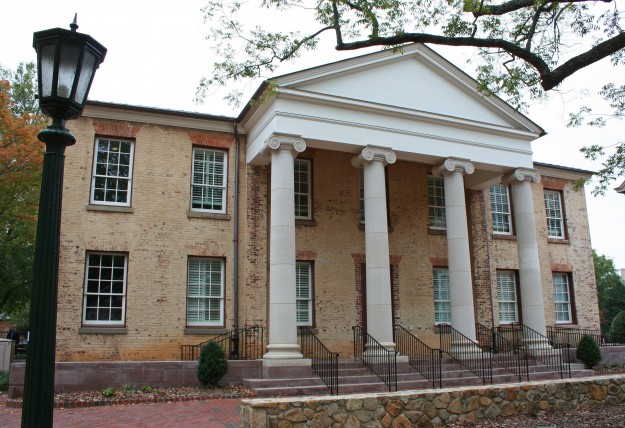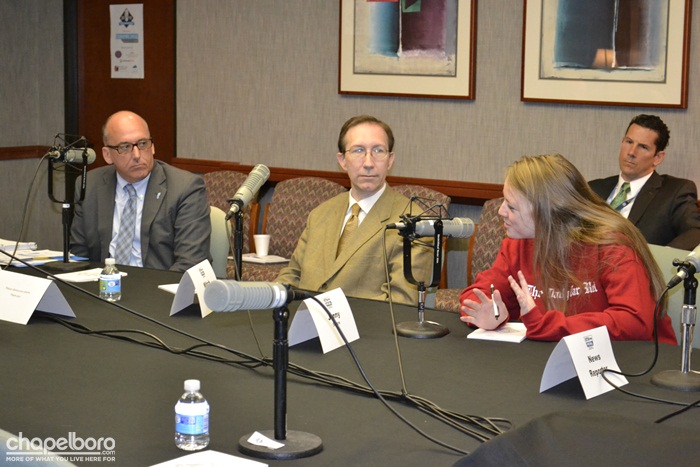The University of North Carolina has been under an intense microscope in recent years, dealing with questions from an academic scandal that spanned nearly two decades.
The issue of public records being filled by UNC has been a topic of many media stories in recent years, including whether the university was releasing all of the information that it should be handing over as part of public records laws. Recently these accusations were made by The Daily Tar Heel after its request for the budget of the Chapel Hill Foundation was denied.
Jonathan Jones, Director of the North Carolina Open Government Coalition and a Professor at Elon University, says the foundation has a history of not having a Form 990 on file, which provides a snapshot into the workings of a non-profit agency.
“There’s a foundation out there that controls a great deal of money, to which many donations that people make to the University of North Carolina are actually diverted to this foundation,” he says.
“People give money to this foundation under the auspices of the University of North Carolina, yet it’s not being transparent in any way – by either filing its Form 990 or being responsive to the public records law.”
Rick White, Associate Vice Chancellor for Communications and Public Affairs at UNC, says the university complies with all regulations.
“I would disagree with Jonathan, I think, on that,” he says. “The university works very hard, certainly, to follow both the letter and the spirit of certainly open records laws.
“To provide information that’s requested by anyone who asks for it – whether be a member of the news media or a member of the public – we work very, very hard to do that.”
The number of public records requests made to UNC has grown from 213 discrete requests in the 2009 – 2010 academic year, to a projected 450 for the current academic calendar, according to White.
He says he feels at times some have mistaken the time it takes for a records request to be filled for a lack of transparency.
White adds some confusion may be caused by the intersections of state and federal laws.
Jones, meanwhile, says he feels the university is benefitting from both sides of the coin.
“The university is claiming on one side that the foundation is not an entity that is subject to the public records law because it’s a non-profit,” he says. “But then on the other side, the reason that it hasn’t been filing a 990 is because there is an exemption for government-affiliated 501(c)(3)’s that don’t have to file a 990.
“And so on one side, they’re saying ‘we’re not a government entity subject to the public records law.’ But then on the other side, they’re saying ‘we’re a government entity, we don’t have to comply with the IRS’ transparency requirements.’”
White says the university has legal standing for the decision to not file a 990.
“There is a regulation, in the IRS regulations, that allows entities like the foundation to not file a Form 990. The foundation did apply for that exemption some time ago. It was granted that exemption,” he says.
“So it had not filed a Form 990 for some time.”
Having said that, White adds that, in the spirit of transparency, the foundation will file a 990 this year.
“The decision has been made, at the chancellor’s urging, that we will be filing that Form 990. You’ll see that this year,” he says. “I think the chancellor recognized that there was a bit of a view there that could be viewed as not being transparent.
“And she is very committed to being transparent and open in our processes here, wanted to do that, encouraged us to do so. And that’s going to happen.”
From Jones’ perspective, while this is good news, this could have been handled years ago.
“From a transparency perspective, the university could have gotten in front of this scandal four years ago,” he says, “the first time that The Daily Tar Heel, and WRAL, and the News & Observer took them to court over public records issues.
“They could have gotten in front of all of this by instituting a system in which they were going to be, if not the most transparent state agency, one of the most transparent state agencies.”
White says the expectation of transparency from the university comes with the territory.
“I think it’s always fair to ask the question, ‘Are you living up to the letter and the spirit of the law? Are you doing what you can do?’” he says.
“It would have been fair, for example, to criticize our university for not being transparent a few years ago, when we were woefully understaffed in our public records office. And it was taking an incredibly long time to get records out of there.”
Jones adds openness is part of being a government entity.
“The idea of public records is that the information that government creates is the property of the people,” he says. “And that they should be able to inspect it, in order to make an informed decision about how well their government is functioning.”
White says he believes the university is moving in the right direction.
“We’ve come a long way on this,” he says, “and really think that we’re doing a pretty good job in terms of being responsive to those kind of requests.”
Jones echoes that under Chancellor Carol Folt he has seen movement from the university to increase transparency, but the work isn’t done yet.
“We’re still in the early stages of Chancellor Folt’s leadership,” he says. “I think in the first year and a half, two years that she’s been there we have seen some positive changes in transparency at the university.
“And I’m a three-time graduate of the university. I want my university, my alma mater, to be the model. And it’s not.”







Comments on Chapelboro are moderated according to our Community Guidelines